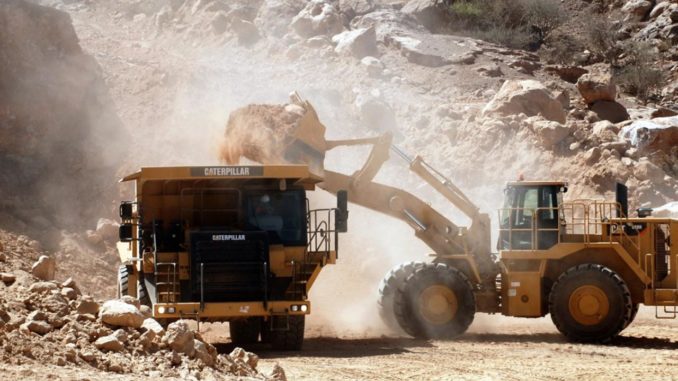
THE recent seizure of about N1.12 billion worth of gold about to be smuggled abroad grabbed media headlines. The Economic and Financial Crimes Commission, in intercepting the illegal gold shipment that was being smuggled through the Abuja airport to Dubai, United Arab Emirates, uncovered a syndicate of smugglers and refocused attention on the dominance of artisans and unlicensed operators in Nigeria’s puny mining industry. This exposes once more, the tragedy of a country that refuses to exploit its natural endowment in minerals to diversify revenue sources, create jobs and restructure the economy.
Despite a sharp drop in oil and gas revenues since mid-2014, near-empty public treasury, recession and frenetic borrowing, the federal and state governments have not seen the wisdom in urgently radically diversifying the economy, content only to mouth empty statements of intent. With 44 identified mineral types of varying quantities and all 36 states and the Federal Capital Territory hosting a combination of some of these, mining is another low hanging fruit that offers ample job creating, export and industrial potential. The Ministry of Mines and Steel Development said the sector contributed only 0.33 per cent to Gross Domestic Product in 2015, down from 4.5 per cent in the 1960s and 1970s when it was a major export revenue earner.
According to the EFCC, the attempted smuggling was orchestrated by a syndicate of illegal miners operating in Zamfara, one of the country’s poorest states that is however rich in gold. The then Minister of Mines and Steel Development, Kayode Fayemi, lamented in 2017 that the country lost about $9 billion in two years due to illegal mining. His deputy and successor, Abubakar Bwari, said a year later that over two million persons depended on artisanal mining nationwide. Instead of promoting a thriving, modern industry that would provide formal jobs, stimulate industrialisation and aid technology transfer, the government appears helpless while illegal miners hold sway over gold, copper, lead/zinc, clay, emerald and a host of others.
The International Labour Organisation, however, describes mining and minerals as “the backbone of most industries;” while a study by geology professor, Olugbenga Okunlola, identified local industries that would benefit from domestic mining to include steel, ceramics, lapidary, construction, glass, cement, agro minerals/fertiliser and electrical.
Whereas some experts say gold could earn the country an extra $1 billion annually, Zamfara for instance, generated only N6.02 billion internally in 2017, as shown by National Bureau of Statistics data, the seventh lowest among the 36 states, but collected N28.45 billion from the Federation Account: the assurance from oil and gas revenues generated elsewhere to service its foreign and domestic debts of $34.83 million and N69.92 billion respectively in 2017 explains why the state, like others, has not taken up incentives encouraging states to attract investors to exploit these resources. Kogi and Nasarawa states have the highest diversity of minerals, but posted only N11.24 billion and N6.17 billion IGR respectively in 2017 while collecting N39.64 billion and N35.19 billion from the central purse.
The Federal Government has not actualised the recent efforts of Fayemi 2015-18; and of Oby Ezekwesili, who held the ministerial office 2005-6: separately, both worked vigorously to prepare the sector for foreign and local investments, but did not stay long enough to see their plans through. Though there has been a rise in export volumes recently, with N26 billion worth of minerals exported in Q1 2018, according to the NBS, much more is lost to the government through illegal mining and smuggling.
We need to change gear and reverse dependence on oil for 80 per cent of our exports. Recent improvements in mineral exports are too meagre, as mining added only N400 billion to GDP in 2015.
Minerals are essential to the industrial sector that currently records less than six per cent to GDP. Apart from being critical to job creation, it is still a major export earner elsewhere: despite commodity price swings, PwC said the world’s top 40 mining companies recorded $600 billion in revenues in 2017, a 21 per cent rise above the $496 billion recorded in 2016. The Federal Government should accelerate action on its road map that followed its adoption of the Nigerian Minerals and Metals Policy 2008. Foreign Direct Investment is essential to drive the industry and stamp out illegal operators and smuggling. States need to compete for investments and external markets as other federal entities do. Mining remains a major primary industry in Australia’s six states and two territories, contributing 3.5 per cent to GDP, but 35 per cent of export revenues. In Canada, the figures are 3.6 per cent and 32 per cent respectively where the provinces of Ontario, Quebec, British Columbia and Saskatchewan compete for local and foreign investments and markets. Mining is recognised as the driving force behind industrialisation in South Africa, the continent’s most advanced economy whose 42,000 megawatts of electricity is 77 per cent powered by its coal; here, apart from the famed Enugu mines, coal deposits are said to abound in 12 other states, while we still rely mostly on gas for the 5,000MW we produce.
Our state governors must wake up to end their dependence on oil; they should invest to make their territories attractive for investment in minerals, agriculture and industry. Minerals offer a way out of empty state treasuries, borrowing and unpaid salaries and pensions. States should be autonomous productive units and all policies should be geared towards this and job creation.
Law enforcement agencies should clamp down hard on illegal miners, smugglers and the corrupt officials who aid them.
END

Be the first to comment